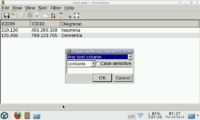Kumaki
Well-Known Member
Wondering if anyone could whip up an app which refers to a database, perhaps a PortaBase database...
The app would need to have an input bar with three options:
ICD9
ICD10
Name
You would type in in the field what you wanted, and then it would search the database and display the requested item.
The line item displayed should then list all three values.
This is so that I can have a handy little reference I can carry with me in my work to know Billing Codes.
Likewise an app that would do the same, but only needs two entries:
CPT
Name
This would refer to a database as well...seperate from the first database.
Anyone in the medical field would know what this was for and why I want it.
In short it would be a pocket appendix of medical billing codes.
This way if I happen to need to look up the ICD9 code for Hypertension (401.9) I could type in "Name" Hypertension...and it would come up with the name (Hypertension) as well as the ICD9 and ICD10 codes for it.
Or if I need to look up a routine office visit (99213) in the CPT filed...I could type in the name and get the code.
Likewise it needs to reverse, so that I can enter a code, and find out what it relates to...for example, in the ICD9 database...
If I entered in the "ICD9" field 290.0 - then it would return the ICD9 code 290.0 the ICD10 equivalent...and the Diagnosis, in this case, 290.0 refers to "Senile Dementia, Alzheimer Type"
Could someone whip up a simple app that would do this?
I will, myself, build the actual database. Just need the app as a shell which references the database.
I'd name one Database "ICD"
the other "CPT"
I do not even know what file extension PortaBase saves as.
At any rate, I can then add or change my database as I need. I just need the app that will access the database and display the wanted info.
I hope someone who would help me is clear on what I'm looking for.
The app would need to have an input bar with three options:
ICD9
ICD10
Name
You would type in in the field what you wanted, and then it would search the database and display the requested item.
The line item displayed should then list all three values.
This is so that I can have a handy little reference I can carry with me in my work to know Billing Codes.
Likewise an app that would do the same, but only needs two entries:
CPT
Name
This would refer to a database as well...seperate from the first database.
Anyone in the medical field would know what this was for and why I want it.
In short it would be a pocket appendix of medical billing codes.
This way if I happen to need to look up the ICD9 code for Hypertension (401.9) I could type in "Name" Hypertension...and it would come up with the name (Hypertension) as well as the ICD9 and ICD10 codes for it.
Or if I need to look up a routine office visit (99213) in the CPT filed...I could type in the name and get the code.
Likewise it needs to reverse, so that I can enter a code, and find out what it relates to...for example, in the ICD9 database...
If I entered in the "ICD9" field 290.0 - then it would return the ICD9 code 290.0 the ICD10 equivalent...and the Diagnosis, in this case, 290.0 refers to "Senile Dementia, Alzheimer Type"
Could someone whip up a simple app that would do this?
I will, myself, build the actual database. Just need the app as a shell which references the database.
I'd name one Database "ICD"
the other "CPT"
I do not even know what file extension PortaBase saves as.
At any rate, I can then add or change my database as I need. I just need the app that will access the database and display the wanted info.
I hope someone who would help me is clear on what I'm looking for.



